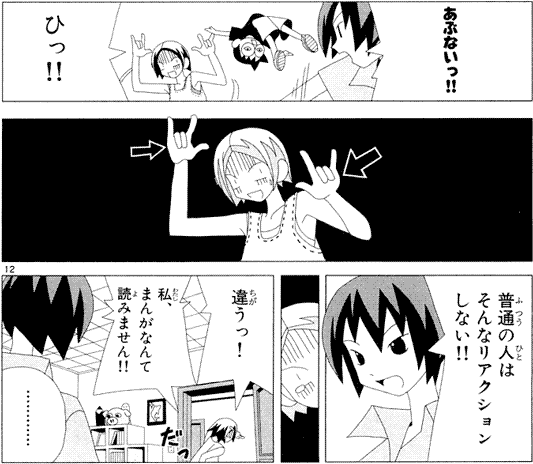In English, raws are the untranslated manga chapters and anime episodes. A raw manga, or manga raw, is the manga as written in Japanese. A raw anime, or anime raw, is the anime without subtitles and in Japanese, as opposed to an English dubbed version.
The term may also be applied to doujinshi 同人誌, games, visual novels, light novels, etc.
- Context: what a raw manga looks like.
- See also: rumic hand sign.
A lot of series are consumed through official translations or unofficial ones (scanlations, fansubs). A translation, no matter how well-done, is a creative process that changes what the original author intended to convey by mixing in the interpretation of the translator.
If a joke goes over the translator's head, for example, or if he can't translate the joke, it won't make it to the translation, so fans strive to read the raws and watch the raws in order to skip this middleman.
Meaning
The word raw means unprocessed, unedited. Just like they say the "raw story," a raw manga is a manga that hasn't been edited by anybody, but what about raw anime?
To translate a manga you need to remove the Japanese text, but to translate an anime you just need to add subtitles, the original, unedited Japanese audio is still there, and you can toggle the subtitles on and off, so why is raw anime even a term?
Basically, because the subtitles that were found in fansubs couldn't be turned off. They were "hardsubs," which means the subtitles were burned into the video, as opposed to "softsubs," that existed as a separate file (e.g. with a .srt extension) and could be toggled on and off.
Fansubs used hardsubs for two reasons: first, due to the lack of widespread support for subtitle files, and, second, due to the lack of capabilities of separate subtitle files.
Some fansubs made use of subtitles shown at bottom and top of the screen simultaneously, the top showing "translation notes," or "TL notes." This was the sort of functionality that the basic closed captions wouldn't have.
Some used colored, animated subtitles for the opening and ending of an anime episode.
All this extra stuff is the reason why subtitling software like Aegisub exists.
Non-Japanese
For the record, a raw can also be non-Japanese, e.g. an untranslated manhwa, in Korean, or an untranslated manhua, in Chinese.
Naming of Raw Files
Raw files (illegally) shared over P2P networks appear to have some sort of file naming standard that pirates follow for some reason.
(File type) [Authors] Title.
Some examples:
(一般コミック) [小畑健×大場つぐみ] DEATH NOTE -デスノート- 第01巻- ippan komikku
一般コミック
General comic. - As opposed to:
- seinen komikku
成年コミック
Adult comic. - Takeshi Obata × Tsugumi Ohba
小畑健×大場つぐみ - Typically, when there are two authors, one is the writer and the other is the comic artist.
- dai ikkan
第01巻
First volume. - zen N kan
全〇〇巻
All N volumes.
- ippan komikku
(アニメ BD) 銀河英雄伝説- anime BD
アニメ BD
Blu-ray disc of an anime. - ginga eiyuu densetsu
銀河英雄伝説
Legend of the Galactic Heroes
- anime BD
(一般小説) [長月達平] Re:ゼロから始める異世界生活- ippan shousetsu
一般小説
General novel, as in a light novel. - Tappei Nagatsuki
長月達平 - Re: Zero Kara Hajimeru Isekai Seikatsu
Re:ゼロから始める異世界生活
Re: Life in a different world from zero
- ippan shousetsu
In similar fashion, fansubbers use brackets around their names on files they edit, e.g.
[SomeFansubberGroup] One Piece.mp4

But sometimes, why do some fansubbed not translate it to eng or other language? Is it because some fansubbed need abilities to learn the language? Or they just cant for some reason? I d like to know the reason why they dont translate "raw"
ReplyDeleteBecause translating takes a lot of work and time and not everyone wants to spend those on translating anime. Raws are not fansubs. They are what the fansubbers use to make the subs. Or you can watch them if you understand Japanese.
DeleteMay I add that it's really a lot of work. Usually you need a scanlator, a translator, a cleaner, a proofreader, a typesetter, a redrawer, a qulaity-checker. And usually you need more than one person per job.
DeleteI knew a teams consisted of just 2 or 3 people, but they usually do couple of mangas (if they finish them ever) and then retire. Hellovajob with no one to thank T_T
What's a "tank" version of a manga?
ReplyDeleteIt's short for tankoubon. If a manga is serialized in a magazine (one chapter per month for example), the chapters are then compiled into book volumes and sold separately, each volume is a tankoubon.
Delete